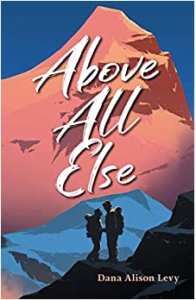When I was younger, I loved a good climb. Mostly of trees and free-standing structures, tho if I’d had a shot at a climbing wall, I’d have totally been up for that, too. So when my college roommates invited me to join the hiking club, you’d think I’d be all in. Unfortunately, club hiking required club camping, and an adolescence of indifferent living conditions in the pursuit of boarding-school-mandated “character building” had already made me deeply suspicious of any endeavour that eschews climate control and indoor plumbing for more than 8 hours at a stretch.
 Thus it is no surprise that mountaineering is not high on my list of fun activities. The entire anathema idea of “roughing it” aside, I literally have no idea why anyone would throw themselves at a mountain side given the high risk of injury or worse. This may also be my bad knee talking: the first time I blew out my knee after a weekend of waitressing and paintball, I cried with fury at being immobile for several days, which is one reason I’ve given up hiking in favor of biking whenever possible, to preserve my mobility.
Thus it is no surprise that mountaineering is not high on my list of fun activities. The entire anathema idea of “roughing it” aside, I literally have no idea why anyone would throw themselves at a mountain side given the high risk of injury or worse. This may also be my bad knee talking: the first time I blew out my knee after a weekend of waitressing and paintball, I cried with fury at being immobile for several days, which is one reason I’ve given up hiking in favor of biking whenever possible, to preserve my mobility.
Which is all to say that entertainment about risky mountaineering activities is not something I would choose on my own. I remember watching the trailer for Everest and thinking, “Disaster porn, ugh, hard pass.” So when Dana Alison Levy’s Above All Else crossed my desk, I was skeptical as to how much I’d enjoy a tale of two teenagers facing the challenge of summiting Mount Everest.
I was immediately drawn in by the two narrative voices tho, of our heroes, Rose Keller and Tate Russo, teenage climbing prodigies who are about to ascend Everest. Rose is the half-Puerto-Rican, half-white overachiever who is absolutely gutted when her climber mother is diagnosed with multiple sclerosis, ending Maya’s climbing career. She wants to summit Everest to honor her mom, even as a gnawing Dread at all the unknown variables of her future dogs her every step.
Her best friend Tate is a more naturally gifted climber but has his own issues, especially with his climber dad, who thinks Tate needs to apply himself to more of life than just climbing. After a bad fall on Mount Rainier, however, Tate discovers that maybe climbing isn’t the end all he’s always thought it was.
The story of RoseandTate’s journey to and through Nepal is gripping, with some really evocative sports and travel writing in addition to the interpersonal dynamics of our protagonists and their fellow travelers. I found Tate’s journey to be especially engrossing, because I absolutely found him irritating in the middle of the book but loved how he’d learned the power of a positive no by the end. More wrenchingly, Ms Levy pulls no punches in describing the toll Everest takes on both sport climbers and the sherpas they hire to help them summit, and I cried and cried when the price becomes too high for at least one mountaineer. I would still never climb Everest, but I’ve already donated money to The Juniper Fund because I was so intensely moved by Ms Levy’s depiction of life on the mountain. And, were it not for my bad knee, I might have been persuaded by her writing to reconsider my aversion to hiking. I’m still a hard pass on camping tho.
Above All Else by Dana Alison Levy was published October 13th 2020 by Charlesbridge Press, and is available from all good booksellers, including
Want it now? For the Kindle version, click here.

3 comments
I’ve climbed a reasonable amount in Germany and a few other places, not much above 3000 meters, though. It’s still enough to have stood at the base of the Eiger’s north face and thought, “Fuck me, that’s a monster.” I mean, I wasn’t going to leave the valley at all and it was still very scary.
Teens climbing Everest? I mean, it’s been done (though I think is maybe now prohibited), and I can see it would be appealing as a premise for an author (and marketing department) but my suspension of disbelief would have a difficult time. But I’m probably well out of the intended audience.
Author
I’ve known enough climbers and overachievers to have absolutely zero disbelief at any of the stuff presented in this book, which is really quite well done. My bone-deep inability to comprehend why anyone would do any of this in the first place aside, I can definitely see teenagers being just as interested as their older climbing-mad counterparts. Also, Rose and Tate are both 18, so old enough to make their own terrible decisions about this, IMO.
Ah ok, 18. That makes a good bit of difference; I was picturing more in the 14-16 range, which is why I was having a hard time.
The modest heights that I have managed are both gorgeous and glorious. I can imagine that only gets better as you go up. There’s also a terrific feeling of accomplishment. Plus parts of it are just plain fun to do, and in the moment it is as wonderfully engrossing as any sport. I imagine that, too, gets better as you master greater challenges. And then there are people who just go looking for limits to push.